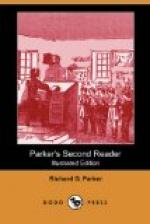Daughter. But, mother, the match is made of wood,—why does that take fire so easily?
Mother. It is true, Caroline, that the match is made of wood; but it has something at the end of it, which takes fire much more easily than the spirits of turpentine. Indeed, so easily does it take fire, that it requires only so much heat to set it on fire as can be obtained by drawing the match once across the sand-paper.
Daughter. But, mother, matches do not always take fire. I have seen Alice rub several across the sand-paper, before she could set one on fire.
Mother. That is true, and the reason of this is, that the matches are not all well made. Now, if I should take several pieces of hard wood and tie them together, and dip their ends into the spirits of turpentine, what would happen, if the ends of some of the pieces did not touch the spirits of turpentine, because I had not tied them together with their points all even?
Daughter. Why, mother, some of them would take fire easily, because the points had the spirits of turpentine on them; while those which did not touch the spirits could not be lighted so easily.
Mother. So it is, my dear, with the matches. They are all dipped into the substance which takes fire so easily; but some of the ends do not reach the substance, and do not become coated with it, and therefore they will not light more easily than the pine wood of which they are made.
LESSON XVIII.
The same subject, concluded.
Daughter. Well, mother, I understand, now, how the match is set on fire. It is rubbed on the sand-paper, and that produces heat, and the heat sets the match on fire. But I always thought that fire makes heat, and not that heat makes fire.
Mother. Heat does not always make fire, Caroline; for, if it did, everything would be on fire.
Daughter. Everything on fire, mother! why, what do you mean?
Mother. I mean, my dear, that everything contains heat.
Daughter. Everything contains heat, mother, did you say? Why, then, is not everything warm? Some things, mother, are very cold; as ice, and snow, and that marble slab.
Mother. Yes, my child, everything contains heat, as I shall presently show you. When Alice goes to make a fire in a cold day, she does not carry the heat with her, and put it into the fire, nor into the wood, nor the coal, does she?
Daughter. Why, no, to be sure not, mother.
Mother. And the heat that comes from the fire, after it is made, does not come in at the windows, nor down the chimney, does it?
Daughter. Why, no, mother; it feels cold at the windows, and cold air comes down the chimney.
Mother. But, after the fire is made, we feel much heat coming from the fire, do we not?




